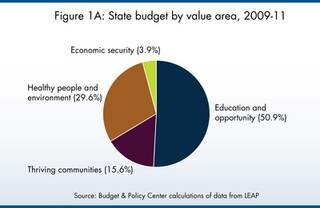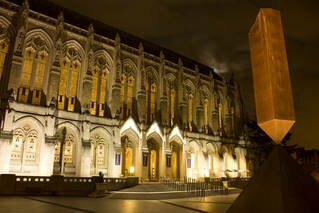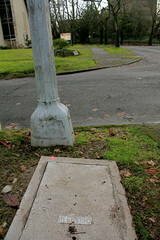"I hate my budget," was the literal money quote from Governor Gregoire, who went on to add, "in some places, I don't even think it's moral."
For the non-budget wonks among us, it's hard to square cutting $4.6 billion out of the 2011-13 two-year budget, so that it still totals a staggering $32.4 billion, with the scorched earth that's being reported: per the Seattle Times, say goodbye to the State Arts Commission and Tourism Office, the Basic Health Plan (an additional 66,000 without health insurance), the Disability Lifeline, state parks funding, and programs for gifted children and juvenile offenders. Here's an itemized list.
(Last Friday, the governor went on to suggest $1.1 billion in cuts from this biennial budget, starting early axe-work on the Basic Health Plan and Disability Lifeline, plus the Children's Health Program, state food stamp assistance, and education funding that supports poorer schools and smaller class sizes.)
 Washington Budget & Policy Center
Washington Budget & Policy Center
So what are we spending $32.4 billion on, exactly? That's the question I asked the Washington State Budget & Policy Center's Remy Trupin the day the state announced a $5.7 billion deficit. You might be surprised to learn that the state's prime directive, as it were, is to fund education. Over half of the state's budget goes to schools ($13.6 billion in 2007-09), higher education ($2.2 billion), and job training ($1.4 billion).
Because education is the state's top priority, that means that health and social services, environmental protection, and things like worker childcare assistance get cut first. But what sounds like a "reasonable" downsizing of the total budget, say six percent, is actually being repeatedly carved out of a much more limited area. Depending on how you slice it, you could be talking about cuts of 25 to 30 percent from budget sectors, and that's when whole programs suddenly go missing....
 Local convicted felon Amanda Knox, currently serving time in Italy for the murder and sexual assault of Meredith Kercher, won a small victory over the weekend when appeal Judge Claudio Pratillo Hellman ordered a review of DNA evidence used at Knox's trial. Two independent experts from Rome's Sapienza University will make new analysis of DNA traces found on the murder weapon and the clasp of the victim's bra.
Local convicted felon Amanda Knox, currently serving time in Italy for the murder and sexual assault of Meredith Kercher, won a small victory over the weekend when appeal Judge Claudio Pratillo Hellman ordered a review of DNA evidence used at Knox's trial. Two independent experts from Rome's Sapienza University will make new analysis of DNA traces found on the murder weapon and the clasp of the victim's bra.
If it's not possible to analyze the DNA, then the investigators will review the analyses that were previously carried out to assess their reliability. Commentators have repeatedly criticized the initial analyses; the bra clasp was not retrieved until three months after the murder, and Knox's defense team claimed that the evidence could have been contaminated.
The review will take at least thirty days, and will begin after the appeal trial's next session, on January 15th. New witnesses are also being heard next month, to refute testimony from Antonio Curatolo, a homeless man who had previously testified that he saw Knox and her ex-boyfriend, Raffaele Sollecito, near the two girls' apartment house on the night of the murder. Knox's appeal is expected to last well into the spring.
 Photo courtesy Slightlynorth of The SunBreak Flickr pool
Photo courtesy Slightlynorth of The SunBreak Flickr pool
- Ballardite goes for win #4 on Jeopardy (My Ballard)
- Kimball crossing guard a jazz and race-relations pioneer (Beacon Hill Blog)
- Elliot Bay Plaza Sold for $54.25 Million (belltownpeople)
- 2 video views of the SPD shooting death of a Capitol Hill homeless regular (Capitol Hill Seattle)
- Pedestrian deaths disproportionately high in Central District (Central District News)
- Local Ferry Service Connects Eastlake to South Lake Union's FarmBoat (Eastlake Ave)
- The Stone Way Pit May Finally Be Turned Into…Something (Fremont Universe)
- Seattle Farm Coop seeks new warehouse (Blogging Georgetown)
- Senator Ed Murray to receive social justice award for improving the lives of LGBT families (My Green Lake)
- Breakdown of Farmers Market costs (Magnolia Voice)
- Read more about proposed Thornton Creek project (Maple Leaf Life)
- City updates multi-family code to allow for more variety in housing (PhinneyWood)
- Seattle Center to move ahead with Chihuly ‘glass house’ plans, KEXP studio and kids playground (Queen Anne View)
- SPD’s South Precinct Gets Fourth Commander in Four Years (Rainier Valley Post)
- The Seattle Times looks at Candy Cane Lane, past and present (Ravenna Blog)
- No permits? No problem for ‘Jiggles’ strip club (Roosiehood)
- Setting the Record Straight on the Columbia City Cinema (Southend Seattle)
- The Cold-Season Diet: Foods that strengthen your immune system (South Seattle Beacon)
- Public Art Coming to Mercer Corridor Project (The Southlake)
- Student robbed at gunpoint (U District Daily)
- Learn how Trophy makes those festive cupcakes (My Wallingford)
- Women of Wallingford (Wallyhood)
- Sewage spill cleaned up at Meadowbrook Pond (Wedgwood View)
- Newest moves in the court fight over ‘The Hole’ (West Seattle Blog)
- White Center in the TV spotlight on KING 5 – twice (White Center Now)...
 Our Flickr pool's Great Beyond gives us "Broken Obelisk at night"
Our Flickr pool's Great Beyond gives us "Broken Obelisk at night"
Ladies and gentlemen, we are taking on water, and in order to survive, some passengers need to be thrown overboard. The good news is that first class and corporate passengers are exempt. Those passengers are welcome to visit our new and improved buffet and to enjoy dancing well into the night.
This announcement also bears a striking resemblance to the weak-kneed announcement regarding the tax "deal" issued this week by the president, now living as a hostage in the White House to cynicism and greed. Just like the middle and lower classes of America.
Here at the University of Washington, this announcement was both expected and anticipated. We've been watching the water rise for a few years now. What this dispatch addresses are the various reactions across campus to the announcement.
- A dean, in an effort to sooth anxiety, sent out an email that said we should go into the holiday break in denial and just enjoy ourselves.
- The interim president, in an article in the Tacoma News Tribune this week, naively insisted that the necessity to accept "alternative funding" (read: corporatization/privatization) would never change the identity and mission of the UW.
- The faculty senate continues to meet, consternate, debate, proclaim, and declare in the cold ocean of irrelevance, since the idea of shared governance at UW is nothing more than a condescending platitude.
- Units and departments frantically rearrange deck chairs, even as the deck chairs themselves are becoming scarce.
- Students who face double digit increases in tuition, larger classes and reduced course offerings continue to Facebook and YouTube their lives away in blissful apathy, gently rocked by the waves of inevitability....
 Earlier this week, I posted about the growing concern that Colony Collapse Disorder may be driven in part by bees' exposure to clothianidin. Clothianidin is part of a class of systemic pesticides known as neonicotinoids, and they have been used widely across U.S. agriculture since the early to mid-1990s. "Systemic" refers to the fact that the pesticide pervades the plant it's applied to entirely, and so any troublesome insect that takes a bite of any part, from root to leaf, will be poisoned.
Earlier this week, I posted about the growing concern that Colony Collapse Disorder may be driven in part by bees' exposure to clothianidin. Clothianidin is part of a class of systemic pesticides known as neonicotinoids, and they have been used widely across U.S. agriculture since the early to mid-1990s. "Systemic" refers to the fact that the pesticide pervades the plant it's applied to entirely, and so any troublesome insect that takes a bite of any part, from root to leaf, will be poisoned.
When bees began dying off in large numbers in Europe, the precautionary principle was employed and neonicotinoid use was restricted or banned. (With interesting bee-bounceback results.) In the U.S., where the EPA professes to have no conclusive reason to act, beekeepers have been left to enforce their own boycott.
A SunBreak reader alerted me to the work of Dutch toxicologist Henk Tennekes (not the climate change impact skeptic), and his research that concludes honey bees and birds can scarcely help being affected by neonicotinoids. "Improper" use of a pesticide is one thing, but his 72-page, heavily footnoted scientific treatise, A Disaster in the Making, demonstrates that this class of pesticides is unsafe in any hands.
"It is a serious ecological report rather than a book for general readers," warns the website, but a serious ecological report is exactly what is required. Tennekes explains in this podcast that neonicotinoids are persistent in the environment in two ways: first, they can be active for months in plants they're applied to, but more importantly, their neurological effects (a dérangement de tout les bee sens) may be irreversible.
Neonicotinoid insecticides act by causing virtually irreversible blockage of postsynaptic nicotinergic acetylcholine receptors (nAChRs) in the central nervous system of insects. The damage is cumulative, and with every exposure more receptors are blocked. In fact, there may not be a safe level of exposure....
(more)
Help us, HAL 9000, you're our only hope
It's ironic that computers run on binary code, because it's us humans who tend to see things as either ones or zeroes. Deciding a moral issue? Pick right or wrong. A political one? Pick Democrat or Republican. An athletic one? Pick win or loss.
Those who want to skitter between two absolutes usually find themselves traveling a road bumpier than Madison St. after a Pineapple Express. Recently, in morality, Jack Kevorkian. Lately, in politics, Barack Obama. And now, in basketball, the University of Washington Huskies.
The humans who cast votes in the Associated Press national basketball poll look at the Huskies and see they've lost three, won six. They therefore do not consider Washington one of the top 25 teams in the country.
But computers see shades of gray. They note that the three teams who've beaten the Huskies are among the nation's best. That those three losses were by a combined 13 points. And that, in their six wins, the Huskies have beaten their opponents by an average of 33 points.
So the two best-respected computer polls make a far different assessment than humans do. Ken Pomeroy's computer rankings put Washington 7th in the country. Jeff Sagarin's USA Today computer ranks the Dawgs 5th (look in the "predictor" column, which accounts for margin of victory).
Of course it's not "computers" that make these rankings, it's people who have programmed the computers. But they do so precisely to banish the indefensible preferences of the human mind from the multi-million-dollar business of prognosticating basketball games....
 The Capitol Hill streetlight/shock device (Photo: CHS)
The Capitol Hill streetlight/shock device (Photo: CHS)
"We discovered that the original installation in 2006 did not include proper grounding of the four lights," said superintendent Jorge Carrasco. "We want the public to be assured that this was an isolated incident."
It was true that, so far as anyone knew, this was the first dog to be killed by streetlight electrocution. But...City Light couldn't really assure anyone, in the actual sense of the word, that there was no further danger because they needed to inspect other streetlights first.
Once they did, a troubling trend emerged. They found another streetlight "leaking" unsafe levels of electricity in High Point. That's not the troubling part per se; that would come when the Carrasco, the "city's highest-paid executive" called the Queen Anne and High Point problems "two isolated incidents."
As CHS reported, City Light soon found three more dangerous light poles discharging electricity--60 to 105 volts. Perhaps more upsettingly, City Light didn't actually find these poles--a contractor did, who took it upon himself to go check on what he estimated would be trouble spots due to aging infrastructure. Two of the poles were 30 to 40 years old, and the third was even older.
Meanwhile, City Light had inspected some 270 light poles without finding any problems in "all of the streetlights at the High Point Development (170) and all of the streetlights at the GreenBridge Development (which actually is in King County, but a part of our service territory - there are 100)."
On Wednesday, a sixth pole was found in Greenwood, discharging "120 volts, enough to kill," reported the Seattlepi.com. So far from being an "isolated incident," streetlights that could electrocute you have been found in Queen Anne, Greenwood, Capitol Hill, Central District, and First Hill. ...
 Of course, the problem could also be the model Pacific Place shopper (pictured) won't fit beneath the low ceilings of a parking garage.
Of course, the problem could also be the model Pacific Place shopper (pictured) won't fit beneath the low ceilings of a parking garage.
I've been using Occam's Razor a lot lately--if I could, I'd shave with it and save a ton of money--so I wonder if a consultant is needed. The thing is, the parking garage worked like a charm for the first eight to ten years of its existence. Even though it was priced below market rate, at $2 per hour, it made up enough in volume (it parks 1,200) to pay for its debt and operations.
It's just that more recently, between 2004 and 2009, use has fallen almost 18 percent, says the Times' Emily Heffter. In 2008, it failed to make enough money to pay for itself. (By city ordinance, it's forbidden to make a profit or build up substantial cash reserves.) In tandem with use falling, the parking rate there has increased to $5 per hour.
It's as if, in a microeconomic sense, there's some indefinable but real-world relationship between the cost of parking and the number of people willing to park there--while at the same time, there's the macroeconomic effect of a major economic downturn having taken place.
To rejigger an old expression, "If it wasn't broke before, undo whatever you did to fix it." In this case, that would seem to indicate rolling back prices. (This doesn't mean you should lower on-street metered parking rates; they are being used so much they're never open, which indicates that most people find them a good deal, comparatively.)...
 Bloomberg Businessweek has assembled one of those link-bait "Best Blank to Blank in the U.S." lists ("America's Best, Affordable Places to Raise Kids"), which are like...not crack, what's something more credible...um...like bacon cheeseburgers to us, so here you are. As it turns out, the kid-friendliest di tutti citta in the state may be, for our local readers, a shocker.
Bloomberg Businessweek has assembled one of those link-bait "Best Blank to Blank in the U.S." lists ("America's Best, Affordable Places to Raise Kids"), which are like...not crack, what's something more credible...um...like bacon cheeseburgers to us, so here you are. As it turns out, the kid-friendliest di tutti citta in the state may be, for our local readers, a shocker.
The Best Place to Raise Your Kids in Washington state is...Pullman. Ready for the next jab? The runner-up is West Richland. Now, this may not be as remarkable a west-side shut-out as it appears, as to judge from the blurb, the key criteria were "bordering Idaho," "wheat fields," "geographic marvels," and "high WASL scores." Also, "Pullman is a seat of learning and home to Washington State University."
Obviously not every city can be home to WSU, and there's no arguing the wheat field gap with our eastern neighbors. Bloomberg didn't even mention the Giant Palouse earthworm, which we have absolutely no answer to, and which you have to know is like...oh god, not crack again...uh...well, it's like any giant weird creature to kids.
In all seriousness, Bloomberg says they wanted to focus on smaller towns and cities, and not large, urban areas. I suppose that's nice and Norman Rockwell, but really? It seems a substantial assumption that kids are better off getting run over by a wheat combine than the express bus to downtown. Have you ever looked at the kinds of accidents farm kids are prone to? It's gruesome, and nearly always involves losing an arm to a machine. Still, it's a gut-check to realize that Eastern Washington still came out in front on the following:...
 O'Dea's student section: Note "ref guy," "condom hat guy," and "golf breeches guy."
O'Dea's student section: Note "ref guy," "condom hat guy," and "golf breeches guy."
So you have O'Dea. An all-boys Catholic high school. Their student section stands, chants and moves in unison. Their basketball team plays an intricate, switching style of defense. Their coach, former Sonic Al Hairston, paces the sideline poker-faced, arms crossed.
Then you have Rainier Beach. A co-ed public high school. Their cheerleaders didn't manage to show up until halftime. Their basketball team plays a playground-style, drive-and-dish offense. Their coach, Mike Bethea, shouts and gestures wildly at his players all game.
O'Dea, the 2nd-ranked 3A boys basketball team in the state: Order.
Rainier Beach, ranked 1st: Chaos.
Who wins? Tuesday night, Chaos triumphed, in a fittingly chaotic finish.
Chaos smacked Order at first. Beach sped to a 24-12 first quarter lead, beginning the scoring with a thunderous Michael Middlebrooks dunk. Later, Hikeem Stewart, who'll play for the University of Washington, turned chaos into an art form. Stewart drove from the right wing down the baseline, collapsing the O'Dea defense around him, then passed to an open teammate on the left wing. But Stewart wasn't done. He followed the path of his pass, ending up along the baseline opposite where he started. The teammate he'd just passed to fed it back to Stewart, who set himself, received the pass, and swished in a three-pointer. He had four threes in the first half....
Hello!
Twitter: @thesunbreak | Facebook
iPhone app download (Free!)
Subscribe to The SunBreak
Delivery Options
![]() Subscribe to all SunBreak Stories
Subscribe to all SunBreak Stories
Daily Email Digest of The SunBreak
Most Viewed Stories
Recently in Our Flickr Photo Pool
www.flickr.com
|
Our Facebook Fan Page
Neighborhood Blog News
Niche Blog News
Seattle Weather
Get the SunBreak iPhone App

Download the SunBreak iPhone app for free.




Most Recent Comments